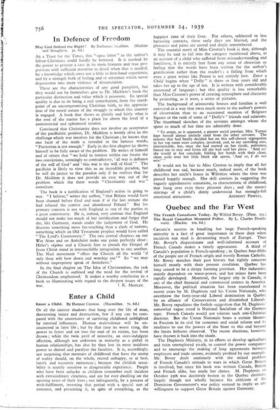Enter a Child
Enter a Child. By Dormer Creston. (Macmillan. 7s. 6d.)
OF all the sinister shadows that hang over the life of man, threatening injury and destruction, few if any can be com- pared with the uncertainty of surviving childhood unblighted by external influences. Human malevolence will be en- countered in later life ; but by that time its worst sting, the power to fester and eat into the soul of its victim, has been drawn ; while the twin peril of minority, an over-indulgent affection, although not unknown in maturity as a pitfall in human relationships, has also by then lost its most insidious power to shrivel and paralyse the faculties. It is, accordingly, not surprising that memoirs of childhood that have the stamp of reality should, on the whole, record unhappy, or at best, lonely and eccentric existences ; because the childish sensi- bility is acutely sensitive to disagreeable experience. People who have been unlucky as children remember each incident with extraordinary clearness, and are for ever dwelling on the opening years of their lives ; not infrequently, by a process of wish-fulfilment, investing that period with a special sort of romance, and presenting it, in spite of everything, as the
happiest time of their lives. For others, subjected to less harassing contacts, these early days are blurred, and the pleasures and pains are unreal and dimly remembered.
The essential merit of Miss Creston's book is that, although it may be said to fall into the category mentioned above, as an account of a child who suffered from misunderstanding and loneliness, it is entirely free from any sense of obsession or feeling that the words have been written for the author's
gratification rather than the reader's ; a failing from which even a great writer like Proust is not entirely free. Enter a Child begins when " Dolly " is three or four years old and takes her up to the age of ten. It is written with considerable
command of language ; but this quality is less remarkable than Miss Creston's power of creating atmosphere and character by projecting, as it were, a series of pictures.
The background of aristocratic houses and families is well conveyed in a way that owes much more to the author's powers of observation than to an occasional mention of Belgrave Square or the rank of some of " Dolly's " friends and relations. The thumbnail sketches of the servants amongst whom she spent so much of her time are admirably done.
" To attain, so it appeared, a greater social prestige, Mrs. Turner kept herself almost entirely aloof from the other servants. The reasons that had finally decided her on this self-chosen segregation in her top room were complex, involved, and, to my unwilling ears, interminable, but, once she eiad started on her tirade, politeness forced me to stay and listen till she had said her piece. And so,' she would at last conclude, folding her hands with their clean, clean nails over her little black silk apron, And so, I do not mix! ' "
It would not be fair to Miss Creston to imply that all her childhood was sad, because much, indeed most, of the book describes her uncle's house in Wiltshire where the time was passed happily enough. Her skill consists in suggesting the vaguely apprehensive sensations, so characteristic of childhood, that hung over even these pleasant days ; and the uneasy stirrings of a child's dimly understood but strongly-felt




































 Previous page
Previous page